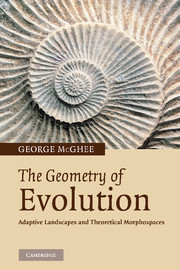Book contents
- Frontmatter
- Contents
- Preface
- 1 The concept of the adaptive landscape
- 2 Modelling natural selection in adaptive landscapes
- 3 Modelling evolutionary phenomena in adaptive landscapes
- 4 The concept of the theoretical morphospace
- 5 Analysing the role of adaptive evolution in theoretical morphospaces
- 6 Analysing evolutionary phenomena in theoretical morphospaces
- 7 Evolutionary constraint in theoretical morphospace
- 8 Evolutionary development in theoretical morphospace
- 9 There is much to be done …
- References
- Index
9 - There is much to be done …
Published online by Cambridge University Press: 14 January 2010
- Frontmatter
- Contents
- Preface
- 1 The concept of the adaptive landscape
- 2 Modelling natural selection in adaptive landscapes
- 3 Modelling evolutionary phenomena in adaptive landscapes
- 4 The concept of the theoretical morphospace
- 5 Analysing the role of adaptive evolution in theoretical morphospaces
- 6 Analysing evolutionary phenomena in theoretical morphospaces
- 7 Evolutionary constraint in theoretical morphospace
- 8 Evolutionary development in theoretical morphospace
- 9 There is much to be done …
- References
- Index
Summary
A second reason for giving theoretical morphology a good run for its money is that, in many ways, it is unlike other sciences. In A New Kind of Science (2002) Stephen Wolfram has controversially suggested that science in the future will be more concerned with algorithms than laws. One wonders how this could be true of all science, but if there is any science of which this is clearly true, that science is theoretical morphology. One of the great success stories of this discipline is the discovery of algorithms that accurately chart the progress of both growth and evolution.
Maclaurin (2003, p. 465)Adaptive landscapes and theoretical morphospaces
The main goal of this book has been to demonstrate to the reader that the concept of the adaptive landscape need not be thought of as merely a heuristic device to conceptualize the process of evolution. The adaptive landscape concept can be put into actual analytical practice through the usage of theoretical morphospaces.
The concept of nonexistent morphology is implicit in Sewall Wright's idea of an adaptive landscape, as is the concept of functional constraint. Theoretical morphospaces allow us to go beyond merely thinking about the possibility of nonexistent morphologies to actually creating, via computer simulation, morphologies and geometries that have never been evolved by life on Earth. Theoretical morphospaces allow us to map the boundaries of functional constraint for a group of organisms within that morphospace.
- Type
- Chapter
- Information
- The Geometry of EvolutionAdaptive Landscapes and Theoretical Morphospaces, pp. 174 - 184Publisher: Cambridge University PressPrint publication year: 2006



